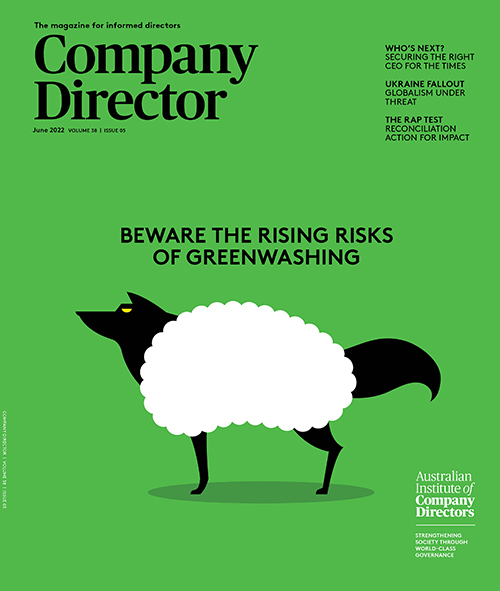This edition of Company Director arrives with AICD members during Reconciliation Week. The week and its theme — Be Brave. Make Change — are a reminder of the important work the country is yet to do to achieve Reconciliation Australia’s vision of an equitable, reconciled Australia.
Aboriginal and Torres Strait Islander people have lower life expectancy, are more likely to live in poverty, more likely to suffer from mental illness and are incarcerated at 10 times the rate of the general population.
The most recent Closing the Gap report, released in 2020, noted mixed progress on measures of health, welfare and opportunity for Aboriginal and Torres Strait Islander people. The target to close the gap in life expectancy by 2031 was not on track. The target to halve the gap in employment by 2018 was missed. While progress was made in education, the target to halve the gap in the proportion of children attaining numeracy and literacy skills was not met.
In national governance, almost exactly five years on from the First Nations Constitutional Convention, which adopted the Uluru Statement from the Heart, there has been little progress made on constitutional change. Yet we have just seen a six-week election where national reconciliation policies and Aboriginal and Torres Strait Islander issues were notable for their absence.
“Where are we, First Nations people [in the campaign]?” asked journalist Stan Grant. “Scott Morrison and Anthony Albanese have said barely anything. Even the teal independents who apparently offer an alternative to the tired politics-as-usual have not made Indigenous people a priority.” Grant acknowledged that Labor supports a referendum on the Uluru Statement, but criticised the lack of detail, particularly around a timeline.
While there is a lack of leadership at the national level to put Aboriginal and Torres Strait Islander issues on the agenda, Grant does not let the electorate off the hook. “Seriously, ask yourself whether any Australian will change their vote because of Aboriginal and Torres Strait Islander people?”
While this edition of Company Director goes to print before the winner of the election is known, it is incumbent on all sides of politics and all members of parliament to give Aboriginal and Torres Strait Islander issues the urgency they need. It is heartening that there were more First Nations candidates running at this election than ever before, with four standing for the Coalition, 11 for Labor and 17 for the Greens, according to NITV News.
As a director community, we also need to do more to elevate reconciliation on our agendas. AICD chair John Atkin FAICD noted at the Australian Governance Summit this year that Aboriginal and Torres Strait Islander disadvantage and inequality do not rank highly in the Director Sentiment Index’s rankings of short- and long-term national policy issues — 12th and 13th respectively.
All organisations operate on Country and the job cannot be left to government alone to achieve reconciliation. The private sector plays a central role in Australian life, so solutions must come from the private sector to make real progress. Boards should be developing strategies for engagement with First Nations stakeholders and contemplating how their organisations can contribute to reconciliation.
More than 1100 Australian organisations now have Reconciliation Action Plans (RAPs). These are fundamental governance documents. As Karen Mundine, CEO of Reconciliation Australia, notes in our feature on page 28, “[a RAP] is a business plan and a way for organisations to think about what is important when it comes to First Nations people and how that is embedded into your policies and processes”. RAPs do not ensure positive outcomes for First Nations stakeholders without backing from the top and embedding throughout the organisation, as we saw with Rio Tinto being removed from the RAP program following its destruction of Juukan Gorge. They can’t just be an add-on to business as usual, says First Nations Foundation chair Ian Hamm MAICD. “A genuine commitment to reconciliation will affect everything a business does.”
The AICD is now developing its second Innovate RAP, informed by an external review into its first Innovate RAP, which identified the need for the AICD to increase its First Nations engagement. Justin Agale MAICD has joined the AICD as Indigenous Sector Lead to support greater impact and focus in the AICD’s work in First Nations governance. We have also run an expression of interest process for an Aborginal or Torres Strait Islander member to join Agale on the AICD’s RAP Working Group.
Reconciliation Australia urges organisations when developing RAPs to consider their sphere of influence. How can the change they make cascade through their customers, suppliers and community? The AICD’s sphere of influence is broad, touching large and small business, not- for-profits and government bodies, across every industry and sector. AICD members will play a vital role in achieving the AICD’s reconciliation goals. We will release details of our RAP and how AICDs members can contribute in coming months. I urge you to join us in being brave and making change.
Latest news
Already a member?
Login to view this content


